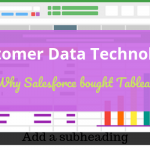Virtues of Data Standards
 After days and days of data cleaning for analysis and lead generation, it’s time to constructively vent….stand by for a less than exciting, but very necessary post. Tech firms seriously need to practice what they preach. They desperately need data standards.
After days and days of data cleaning for analysis and lead generation, it’s time to constructively vent….stand by for a less than exciting, but very necessary post. Tech firms seriously need to practice what they preach. They desperately need data standards.
Our marketing colleagues really should to encourage widespread adoption and encourage sales to adhere to them. Why? Because today’s spreadsheet grows into tomorrow’s biggest corporate asset – your company’s customer data. This is why we believe in the virtues of data standards.
Data Standards Ensure Consistency.. and Analyze-ability
Before we get into tips on data standards for marketing data, let’s talk about why they’re necessary.
Why are data standards important?
They provide an objective set of structures to ensure consistency of data element usage throughout an organization. They also provide important guidelines regarding data element definitions and entry to everyone in the organization, so the business can effectively access and use data.
Don’t just take our word. Check out what the US Government says about them. It’s not just us!
Let’s look at an example. Take my pet peeve – IBM.
- International Business Machines
- IBM
- I. B. M
- Itty Bitty Machines
Or in other words, it’s all the same company. Depending on who types the information, you would sadly never, ever know it.
The only way you do is by looking at each line of data and cleaning it into a standard format. A standard format is one where you agree how punctuation, capitalization, abbreviations are consistently handled.
Please, even basic standards on just contact information can enhance data quality and assist in creating data that is more easily:
- Understood
- Comparable
- Usable
- Accurate
- Complete
- Consistent types of information included (important dates, synonyms, etc.)
- Consistent with business processes
Due to the nature of our industry, where companies start in spare bedrooms and grow very quickly, it’s easy to see why data standards are an afterthought. Most technology companies’ databases start life on a spreadsheet. Customer databases begin with the hasty set-up of a single seat in Salesforce.
Even using a spreadsheet, technology companies would be well-served by a few tips:
10 Easy Data Standards to Make Your Marketing Data Scientist Happy
If you’re using a spreadsheet, set up a form.
it’s easy to do by adding the Form button to your quick access bar. It’s your friend. And mine.
Think about the fields that form, or CRM database, should include first.
And please, avoid the temptation of single contact name field! Instead, pretty please, split out the contact name into first name and last name. And the address? Please make it TWO fields to accommodate a suite number. In addition, now would be a good time to think about a segment field.
Establish common naming conventions
And be consistent in how text fields are completed. For example, going back to the the “State” field… stick to using the two-letter abbreviation, like “CA” instead of writing “Calif” or “California.” Better still, use a pick list so users get this part right.
Establish common and consistent date formats.
And stick to using them.
Establish customer or partner ID number.
This will make you somewhat less dependent on getting company names 100% consistent and correct, every time.
Develop a product numbering scheme that goes along with your product names.
This means you don’t always have to rely on text fields alone.
Complete every item or field in your form when you add an entry
Make sure every… and I mean, each and every record is complete.
From time to time, review for your data for consistency in text fields.
Fix what isn’t consistent. Don’t let mistakes pile up into a mess heap rendering all that data pretty useless.
Spot check your database every so often to be sure folks are entering data correctly.
It’s easier to clean as you go then to tackle it once it’s gotten away from you. And, it’s easier to correct mistakes folks are making quickly than to let bad habits get entrenched
Encourage and reward sales people for good data practices.
After all, a prospect information quickly entered into today’s CRM grows into tomorrow’s biggest corporate asset – your company’s customer data.
Come on, sales! Do your part! You’ll be making your marketing data scientist very happy. And happy marketing data scientists help you sell. Earn higher commission and grow the company!








